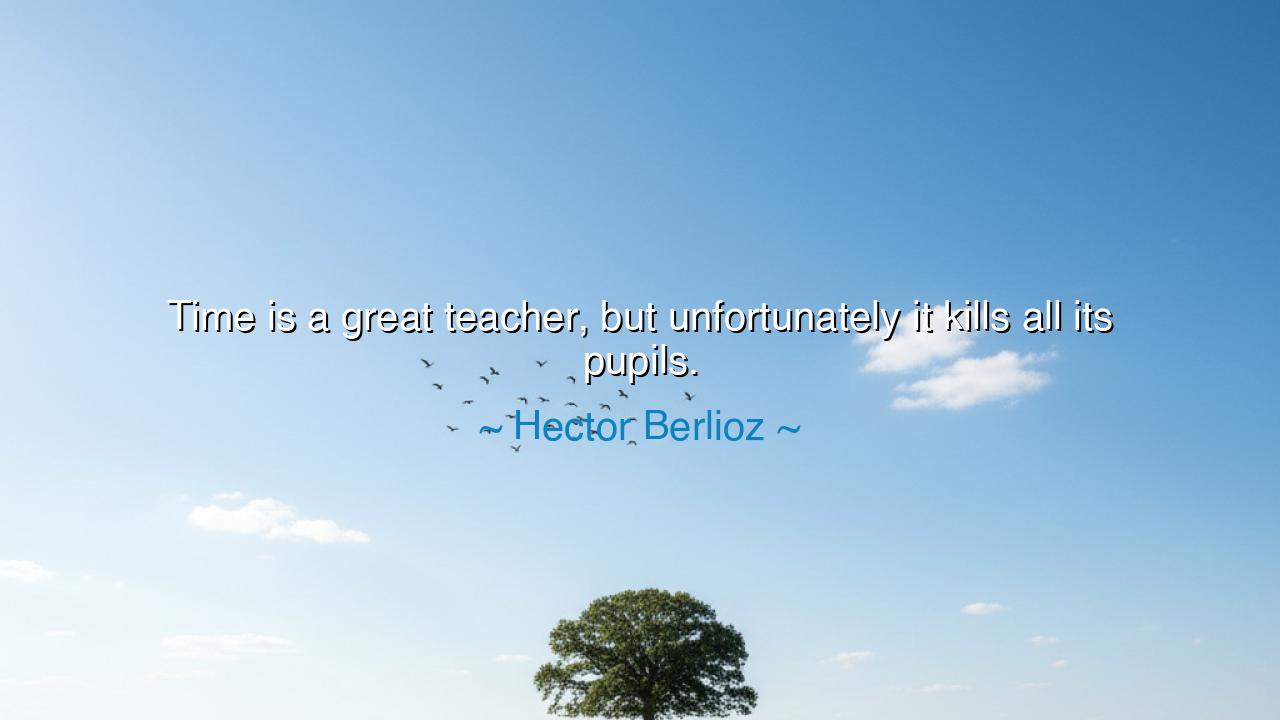
Time is a great teacher, but unfortunately it kills all its






“Time is a great teacher, but unfortunately it kills all its pupils.” Thus spoke Hector Berlioz, the master composer of passion and storm, whose words carry the haunting music of both wisdom and sorrow. With this saying, Berlioz—who wrestled with genius, love, and despair—offered not a jest, but a revelation: that time, the silent sculptor of all things, teaches with perfect patience, yet takes as its payment the very lives of those who learn. It is a truth that is both beautiful and cruel—that the greatest instructor is also the inevitable destroyer.
In this paradox, Berlioz captures the mystery of mortality itself. Time teaches us everything we know—how to love, to create, to endure, to forgive. It grants us experience, deepens our understanding, and reveals the meaning hidden beneath the surface of things. But in the same breath, it consumes us. Every lesson is paid for with the coin of our years; every wisdom gained costs a fragment of our life. Thus, Berlioz reminds us that knowledge is never free, that enlightenment is bought through the steady erosion of existence. Time molds the soul, even as it wears down the body.
Consider the story of Leonardo da Vinci, whose life was one long study of time’s lessons. He watched the movement of rivers, the fluttering of birds, the shifting of shadows upon walls. Each observation taught him the secrets of nature and of art. Yet, as he grew old, Leonardo lamented that there was never enough time—that the more he learned, the more vast the unknown became. His notebooks are filled with unfinished sketches, half-written musings, dreams of flight and invention he would never see completed. Time had taught him everything he could bear to know—but, as with all mortals, it ended the lesson too soon. Thus, even the greatest minds become, in Berlioz’s words, the pupils of time, destined to perish before mastering its final truth.
There is, too, a tone of dark humor in Berlioz’s phrase—a weary smile at the irony of existence. He was no stranger to struggle. A man ahead of his age, misunderstood by critics, driven by unrelenting vision, he knew that time could both exalt and destroy. The same years that honed his art also broke his heart. And yet, within that recognition lies an almost defiant wisdom: if time must kill us, then let us learn magnificently before it does. Let us be eager students, fearless in the classroom of life, knowing that every moment spent in pursuit of meaning is a victory against the void.
Time, in its cruelty, is also merciful. For though it ends all lives, it sanctifies all things by making them precious. The flower that blooms for one season is more cherished than the stone that endures for centuries. The fleeting laughter of youth, the moment of inspiration, the brief touch of love—all burn brighter because they are passing. Were we immortal, we would learn nothing; it is the shadow of death that gives shape to light. Berlioz, through his poetic melancholy, teaches that the wisdom of time lies not in resistance, but in acceptance—to live fully within the span given, and to let the inevitability of loss make every joy more radiant.
The ancients, too, understood this. The Stoics spoke of memento mori—“remember you must die”—not as a call to despair, but as a call to awareness. They believed that to contemplate death was to awaken to life, to see clearly what truly matters. Berlioz’s quote is a modern echo of that same eternal philosophy. Time will take all pupils, yes—but before it does, it gives them the chance to awaken, to create, to love fiercely, and to pass on their light to others. Thus, though the teacher destroys, the teaching endures.
So, my friends, let the words of Berlioz guide you not into sorrow, but into clarity. Learn from time, but do not delay. Cherish your lessons, but do not wait for tomorrow to live them. Each sunrise is a page, each breath a line, each day a chance to write your portion of the eternal song. Know that you will one day be gone—but let that knowledge ignite your spirit rather than silence it. For the truest mastery of time is not to escape it, but to fill it with meaning.
And when the final bell tolls, when the great teacher closes its book, let it be said that you learned well—that though time kills all its pupils, you, in your brief and brilliant course, learned the most important truth of all: that to live, even for a moment in full awareness, is to triumph over time itself.






AAdministratorAdministrator
Welcome, honored guests. Please leave a comment, we will respond soon